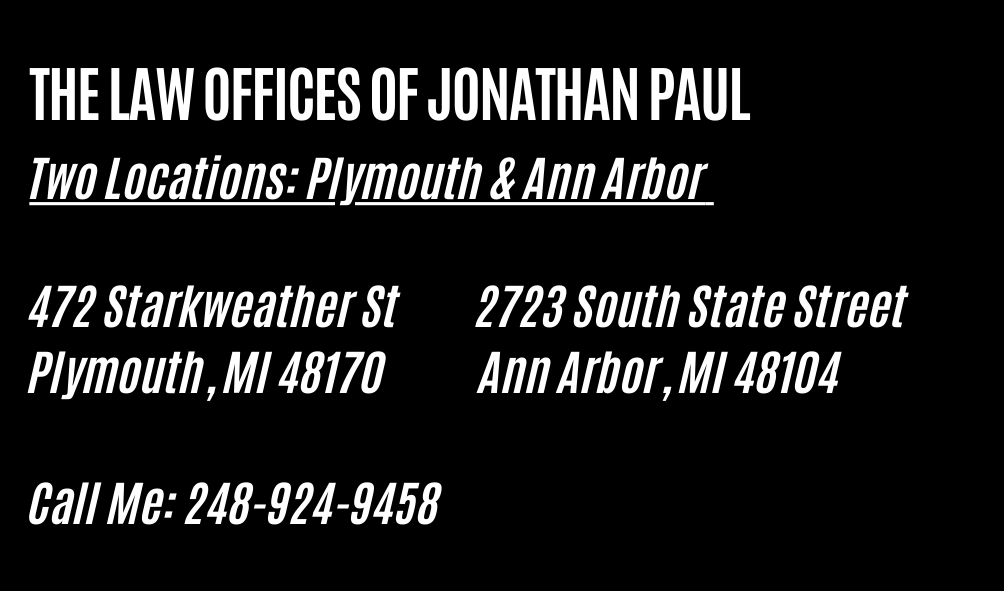|
The majority of DUI cases in Michigan have multiple BAC readings. The first reading typically comes at the scene of the crime in the form of preliminary breath test. Officers offer this test in order to assist in justifying their arrest. The defendant has the option to take the test, or decline; if you decline, it’s a 2 point civil infraction. In the end, this 2 point infraction is usually dismissed anyway as part of an agreement that is worked out with the prosecutor.
Police officers aren’t always clear about the consequences of not taking the test, and are ok with my client believing that a refusal of the PBT will lead to loss of license, and 6 points on their license, which is not true (these sanctions apply to the Datamaster). I typically believe taking the test only hurts your case, because if you blow over the limit, and there is evidence of driving, the officer has a slam dunk case for a legal arrest. Without the test, an officer has to rely on his subjective observations, and if you decline field sobriety tests, then the officer really has to stretch his rationale, and we stand a great chance to challenge the arrest. In Michigan a police officer may arrest a person based in whole or in part on PBT results. Once used as part of the arrest, the test is typically no longer admissible with limited exceptions. So the first part of beating the PBT is to not take it at all. I’ve filed a lot of motions to challenge an arrest, because the cop did not have a PBT result as part of his arrest; we were able to attack field sobriety tests and officer observations and beat the arrest. If a PBT is administered, the question becomes, do we want to try to use the results to help or case, or make sure to keep it out of the case. Most would say, let’s keep it out, because it’s evidence against me. Here is how I have used the PBT to help my clients win at trial. Let’s assume my client is charged with a High BAC/Super Drunk offense in Michigan. We have a PBT result of say 0.13, we then have a Datamaster result of 0.18 an hour later. How can that benefit my client? Well a High BAC prosecution requires that the prosecutor prove beyond a reasonable doubt that when my client was driving his/her car, their BAC was over 0.17. Well alcohol levels go up and down after your last drink. The question is, when the police stop you, are you rising or falling in your BAC level? With these two readings, we have a clear rise in BAC level. This would assist in an argument that my client’s BAC was rising, and likely was below 0.17, and closer to the 0.13 result at the scene. This type of scenario has helped me resolve cases with very favorable plea deals, especially in certain counties than never bargain on Super Drunk cases. We also use these numbers at trial, but in order to introduce the PBT at trial, we need to fit it into one of the three exceptions to the rule. The three exceptions in Michigan are the following:
In order to get the PBT into our case, I would go for the second exception. While it would not be automatically admitted, a crafty cross-examination of the DataMaster operator is likely to be fruitful. With the right judge, it is also possible to sneak the result in through the prosecution’s witness, and most judges in my experience would view the matter as a matter of fairness; if there’s another BAC reading out there that might assist the trier of fact (the jury), they may let it in, and let the jury decide what to do with it. The PBT is not automatically admissible because it is simply not as reliable as the Datamaster, which is tested, calibrated and checked on a regular basis (weekly and every 120 days). Many PBT devices go long periods of time without calibrating and could sit in cold or hot weather for long periods of time. The key is identifying the result, and how to use it to your advantage. Comments are closed.
|
Click to Email Me Categories
All
|
Ann Arbor Office LocationPlymouth Office Location |
Representing DUI Clients in MichiganRepresenting clients charged with a DUI in Ann Arbor, Canton, Brighton, Howell, Saline, Adrian, Taylor, Plymouth, Northville, Westland, Ypsilanti, Pittsfield Towsnhip, Warren, Sterling Heights, Farmington, Pontiac, Romulus, Lansing, Novi, South Lyon, Southfield, Birmingham, Bloomfield Hills, Royal Oak, Troy, Rochester, Jackson, East Lansing, Garden City, Livonia, Dearborn, Detroit, St Clair Shores, Hazel Park, Ferndale, Madison Heights, Waterford, Milford, Shelby Township Clarkston, Oak Park, Berkley, Fraser, Sterling Heights, Clinton Township and others throughout Washtenaw, Wayne, Monroe, Jackson, Genesee, Macomb, Ingham, Lenawee, Livingston and Oakland County.
|








